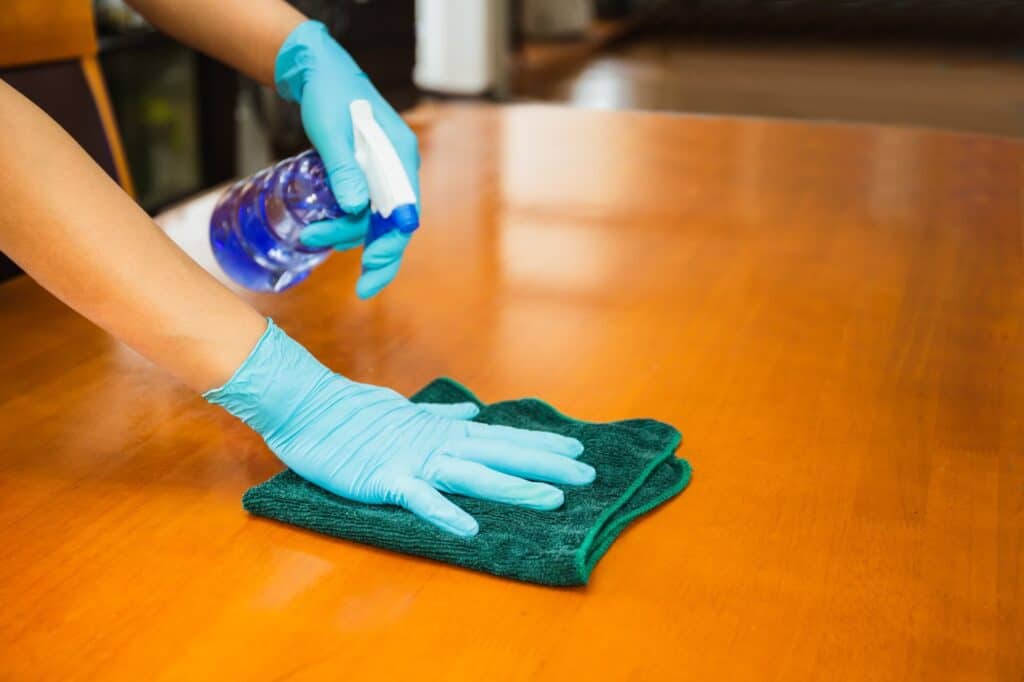Seniors are more vulnerable than the rest of the population to injuries and disease. As people age, their immune systems slow down. This causes their bodies to heal and respond to threats at slower rates. This is why any senior living community you come across will set up strong safety and sanitation systems. Caregivers of senior adults who wish to live at home should do this as well. However, these caregivers may not know how to make such a system. Are you one of these caregivers? If so, read the following guide. This will provide you with sanitation and safety tips that can help your senior loved ones.
Have Emergency Numbers Available
If older adults injure themselves, they will need to get help right away. Does your senior loved one have a smartphone? If so, make sure they can easily access all of these numbers on it:
- Emergency Services (911)
- Poison Control (1-800-222-1222)
- Friends’ and/or family members’ numbers
- Their healthcare provider’s number
If your senior loved one doesn’t have a smartphone, tape a list next to every landline phone in their house.
Prevent Medication Poisoning
Older adults can accidentally poison themselves when they take medications incorrectly. Caregivers may also mix medications up if they become too tired and/or stressed. Safety measures to prevent medication poisoning are necessary.
Caregivers must take the following safety steps:
- Keep medicines in original containers
- Ask for large-print medicine labels
- Take/give medicines in well-lit rooms
- Have a healthcare provider check medications
Prevent Other Types of Poisoning
Unfortunately, seniors don’t just fall victim to poisoning due to taking medications incorrectly. Poisoning-related safety issues can also happen from other living area factors. For example, cleaning products and carbon monoxide can also poison seniors.
Make sure you do the following to prevent these forms of poisoning:
- Don’t mix multiple cleaning chemicals
- Keep cleaning chemicals clearly labeled
- Never attempt to heat a home with a stove or oven
- Put carbon monoxide detectors in all rooms
- Replace carbon monoxide detector batteries twice a year
Lessen Fire Risks
It’s very important to protect older adults against fire hazards. Remember that older adults often have mobility issues. If a fire starts in a home, they may be unable to leave their home fast enough.
If your senior loved one prefers to do many things on their own, teach them about fire hazards. You should also follow fire safety rules yourself. Make sure that no one does the following:
- Wears loose clothes while cooking
- Smokes while laying in bed
- Leaves candles burning in empty rooms
- Places heaters closer than 3 feet from fire-prone materials
- Leaves heaters on after leaving a room
- Keep appliances that have damaged electrical cords
- Attempts to put out any fires in the home
- Puts too many electric cords into a single socket.
Install a Fire Safety System
You may also want to install a fire safety system similar to what an assisted living community may have. Do some research and see what options you have for a residential living area. You should at least be able to install a smoke detector system.
Reduce Fall Hazards
One in four Americans who are 65 years or older fall every year. Senior adults are more prone to falling because they have issues with balance and coordination. It’s important, therefore, to do everything to make it less likely that a senior will fall.
Caregivers should set up their senior loved one’s home in the following ways:
- Put rubber mats in the bathtub and/or shower
- Put grab bars up so the senior can get out of the tub
- Remove all area rugs as the senior could trip
- Give seniors a constantly clean living space
- Have light switches at the top and bottom of all stairs
- Place commonly used items in lower cabinets
Help Them Help Themselves
Is your senior loved one still rather lucid? If so, they may have to handle many fall prevention tasks on their own. Remind seniors to do the following:
- Use the handrail while going up and down stairs
- Use their cane or walker if they have one
- Buy and wear an alarm that can contact emergency services if you fall
- Don’t run across a room to answer the phone
- Wear non-slip footwear to prevent falls
- Exercise to keep up their strength
- Rise slowly after sitting or lying down
Help With Hygiene
Because of mobility issues, some seniors may struggle to handle their hygiene steps on their own. If your senior loved one seems to be struggling with this, gently discuss with them what they want to do. If they decide to accept your help, you’ll likely end up doing the following for them:
- Provide them with sponge baths
- Help them cut their nails
- Brush their teeth
- Comb their hair
Make sure to follow a regular daily routine with steps like these. This will give your day more structure and make you feel more comfortable. You should also schedule more difficult steps around times when your loved one is in a better mood.
Promote Independence
You should, however, let your senior loved ones do as many hygiene tasks as they can on their own. Doing this will help them stay confident and happier. If possible, consider using the following tools to help seniors maintain their hygiene independence:
- Shower chairs
- Elastic clothes
- Non-rinse bathing wipes
- Long-handled shower brushes
- A low-maintenance but great-looking hairstyle
Show Compassion
Above all, make sure that you show compassion. Your senior may feel frustrated about their growing dependence. Show them that you understand how they’re feeling and that they’re still worthy of love.
Try Our Senior Living Community
Yes, as a caregiver you can provide your senior loved one with a safe, sanitary, and comfortable environment at home. All you need to do is set up some safety features, help senior loved ones when necessary, and remind your senior loved ones of the ways they can help themselves.
Still, if your senior loved one ever decides to live in a senior living community, we can help. Our assisted living and memory care community workers take care of moms and dads like they were their own. Get more information by filling out this form.




